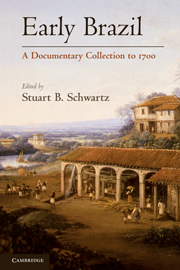Book contents
- Frontmatter
- Contents
- Preface
- A Note on Translation
- A Note on Portuguese Currency, Weights, and Measures
- Maps
- 1 The “Discovery” and First Encounters with Brazil
- 2 The Donatarial System
- 3 Royal Government
- 4 The French Interlude
- 5 Indians, Jesuits, and Colonists
- 6 The World of the Engenhos
- 7 Government and Society in Dutch Brazil
- 8 Burdens of Slavery and Race
- 9 Public and Private Power
- 10 Religion and Society
- 11 Frontiers
- Index
10 - Religion and Society
Published online by Cambridge University Press: 05 June 2012
- Frontmatter
- Contents
- Preface
- A Note on Translation
- A Note on Portuguese Currency, Weights, and Measures
- Maps
- 1 The “Discovery” and First Encounters with Brazil
- 2 The Donatarial System
- 3 Royal Government
- 4 The French Interlude
- 5 Indians, Jesuits, and Colonists
- 6 The World of the Engenhos
- 7 Government and Society in Dutch Brazil
- 8 Burdens of Slavery and Race
- 9 Public and Private Power
- 10 Religion and Society
- 11 Frontiers
- Index
Summary
The missionary clergy, especially the Jesuits, exercised a powerful influence on Catholic religious life in the colony. Brazil was organized around the continued efforts of the missionary clergy among the indigenous peoples and the presence of a diocesan clergy, which administered to the majority of the population. The two spheres, however, were never fully separated, and the members of the religious orders like the Jesuits, Carmelites, Benedictines, and Franciscans – usually referred to as the “regular” clergy – often took an active part in other aspects of religious and cultural life. Then, too, there were various forms of local practice, “superstition,” and heterodoxy carried from Europe that encountered Native American and African practices and beliefs in Brazil. The documents presented here reveal two sides of religious life. The first text is a report on Jesuit activities in northeastern Brazil that underlines the multiple and varied activities of the missionary orders in the colony. It makes clear that the Jesuit activities were not limited to the Native American inhabitants of Brazil. The second text presents two depositions made before a visit of the Inquisition to Brazil, both of which reveal the existence of heterodox thought.
Jesuit Missions: Information for the Lisbon Committee on the Missions, 1702, on General and Economic Matters
(From Serafim Leite S.J., ed., História da Companhia de Jesus no Brasil, Rio de Janeiro and Lisbon, vol. 5 (1945), pp. 569–73).
The following is a brief report on the missions carried out this year in the territory of Bahia and in the Diocese of Pernambuco. A report on those in Rio de Janeiro will be sent separately, should news about them arrive in time. Otherwise, they will be sent in a year's time.
In Pernambuco, Fathers Cosme Pereira and Francisco de Araújo carried out a mission lasting four months and in eighteen places, starting out in Cape Santo Agostinho and ending in Alagoas. The fruits of this mission were the revalidation of thirty-three marriages to which there had been impediments and listening to five thousand, one hundred and ninety-five ordinary confessions. In addition, they heard four hundred and seven general and necessary confessions pertaining to entire lives or to those who had not confessed for many years. There were another thirty heard as a special act of devotion. Holy Communion was distributed to four thousand, nine hundred and seven people. Religious instruction was imparted with particular care to black people. This was also of no little benefit to white people, amongst whom there is just as much ignorance. In that way, the Fathers sought to persuade masters to treat their slaves better, to moderate the punishments that they mete out to them, and to give them all that they need in order to feed and clothe themselves. Many occasions of sin were abandoned, duly remedied by stable marriages. Many made peace with one another, and many deaths were thus avoided, deaths that would certainly have ensued, if the presence of the mission had not caused enemies to become reconciled. By night and by day, it was a major task because certain women in poverty sought absolution at night, and because everybody wanted to make their confession to the missionaries rather than to the [local] secular priests.
- Type
- Chapter
- Information
- Early BrazilA Documentary Collection to 1700, pp. 279 - 288Publisher: Cambridge University PressPrint publication year: 2009



